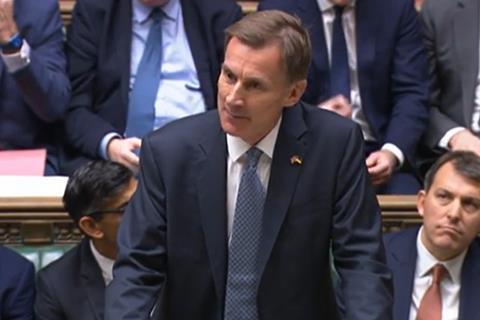Decision comes as OBR forecasts long term pain in housing market
Jeremy Hunt has set out plans to make the previously permanent £1.6bn stamp duty cut introduced by his predecessor in the ill-fated September mini-Budget run for just three years.
The chancellor set out the measures despite in his Autumn Statement this morning despite grim forecasts emerging from the Office of Budget Responsibility (OBR) for the future of the housing market.

Hunt’s decision to cancel from 2025 former chancellor Kwasi Kwarteng’s stamp duty cut, which had increased the nil rate for Stamp Duty Land Tax to homes up to £250k for all buyers, and up to £425k for first-time buyers, came as no other support was offered for the residential development sector, which has seen the long-standing Help to Buy scheme withdrawn in recent weeks just as mortgage rates have shot up to 14 year highs.
The Treasury’s autumn statement documents estimated the decision to reverse the stamp duty cut will earn the government around £4bn in revenue by the end of the 2027/28 financial year.
The OBR published forecasts alongside its Economic and Fiscal Outlook accompanying Hunt’s statement predicting average house prices will now drop for two consecutive years, losing a cumulative 7% of their value. The body estimated that while price growth will return in 2025, values will not return to 2022 levels until 2027.
In addition, the OBR estimated that private housing starts will drop from just shy of 180,000 this year, to 143,000 next year and 127,000 in 2024 – a cumulative fall of nearly 30% in two years. Completions will fall more slowly, it predicts, but will recover slowly too, remain well below the current level of 173,000, at 148,000, at the end of the forecast period in 2027.
Speaking in the House of Commons, Hunt said: “The OBR expects housing activity to slow over the next two years, so the stamp duty cuts announced in the mini-budget will remain in place but only until 31st March 2025.
“After that, I will sunset the measure, creating an incentive to support the housing market and all the jobs associated with it by boosting transactions during the period the economy most needs it.”
Hunt’s predecessor had made clear when he announced the Stamp Duty changes on 23 September that the were planned as a “permanent cut to stamp duty effective from today”.
Other announcements in the autumn statement
- The energy industry will be targeted with an expanded windfall tax of 35%, up from 25%,raising an extra £14bn
- Two new fiscal rules will be established: the year debt is required to fall has been delayed two years, while the new target for borrowing is less than 3% of GDP
- The government will implement a £13.6bn package of business rate supports
- Increases in department spending already set out will be maintained but departments will have to make efficiencies to compensate for inflation
- A new energy efficiency taskforce will help people and businesses save money on energy bills, backed by £6bn in new funding
- Suffolk will get an elected mayor, with devolution deals for Norfolk, Cornwall and the North East in advanced stages
- From April next year, the National Living Wage will be increased from £9.50 an hour for over-23s to £10.42
There was some support in the industry for the idea that by making the measure temporary, Hunt would actually be more likely to stimulate buyers to take advantage of the stamp duty cut while it was in effect. A senior figure at a listed housebuilder said: “While overall transaction taxes hinder transactions, in this case it is good to have an end date to create a call to action and urgency. It could maybe even have ended sooner.”
However, others in the housing sector were more critical. Dominic Agace, chief executive of estate agent Winkworth, said the move was disappointing. He said: “First-time buyers are bearing the brunt of many external factors – from increased interest rates and cost of living to a lack of rental supply making rents spiral and making it harder to save for a deposit. Ending the current cuts in stamp duty in April 2025 is disappointing. The challenges facing first-time buyers are with us for the long-term.”
And Nick Leeming, chairman of estate agent Jackson-Stops, said: “Reversing the cut to stamp duty is unwelcome news for the housing market. Perhaps one of the only positives to come from the ill-fated mini-budget, the decision to put a time limit on the tax break is likely to create a bottleneck of transactions in the first quarter of 2025 as buyers rush to lock in the more favourable stamp duty rate.”
















No comments yet